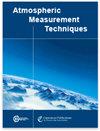A Novel Methodology for Assessing the Hygroscopicity of Aerosol Filter Samples
IF 3.2
3区 地球科学
Q2 METEOROLOGY & ATMOSPHERIC SCIENCES
引用次数: 0
Abstract
Abstract. Due to US regulations, concentrations of hygroscopic inorganic sulfate and nitrate have declined in recent years, leading to an increased importance in the hygroscopic nature of organic matter (OM). The hygroscopicity of OM is poorly characterized because only a fraction of the multitude of organic compounds in the atmosphere are readily measured and there is limited information on their hygroscopic behaviours. Hygroscopicity of aerosol is traditionally measured using Humidified Tandem Differential Mobility Analyzer (HTDMA) or Electrodynamic Balance (EDB). EDB measures water uptake by a single particle. For ambient and chamber studies, HTDMA measurements provide water uptake and particle size information but not chemical composition. To fill in this information gap, we have developed a novel methodology to assess the water uptake of particle collected on Teflon filters, thereby providing an opportunity to link the measured hygroscopicity with ambient particle composition. To test the method, hygroscopic measurements were conducted in the laboratory for ammonium sulfate, sodium chloride, glucose, and malonic acid, which were collected on 25 mm Teflon filters using an aerosol generator and sampler. Constant humidity solutions (CHS) were employed to maintain the relative humidity (RH) at approximately 84 %, 90 %, and 97 % in small chambers. Hygroscopic parameters, including the water-to-solute (W/S) ratio, molality, mass fraction solute (mfs), and growth factors (GF), were calculated from the measurements. The results obtained are consistent with those reported by the E-AIM model and previous studies utilizing HTDMA and EDB for these compounds, highlighting the accuracy of this new methodology. This new approach enables the hygroscopicity and chemical composition of individual filter samples to be assessed so that in complex mixtures such as chamber and ambient samples, the total water uptake can be parsed between the inorganic and organic components of the aerosol.评估气溶胶过滤器样本吸湿性的新方法
摘要由于美国的规定,近年来吸湿性无机物硫酸盐和硝酸盐的浓度有所下降,因此有机物(OM)的吸湿性变得越来越重要。由于大气中的有机化合物种类繁多,其中只有一小部分容易测量,而且有关其吸湿行为的信息也很有限,因此有机物的吸湿性特征还很不明显。气溶胶吸湿性的传统测量方法是使用加湿串联差分迁移率分析仪(HTDMA)或电动天平(EDB)。EDB 测量单个颗粒的吸水率。对于环境和室内研究,HTDMA 测量可提供吸水率和粒径信息,但不能提供化学成分信息。为了填补这一信息空白,我们开发了一种新方法来评估聚四氟乙烯过滤器上收集的颗粒的吸水性,从而提供了将测量的吸湿性与环境颗粒成分联系起来的机会。为了测试该方法,我们在实验室使用气溶胶发生器和采样器对硫酸铵、氯化钠、葡萄糖和丙二酸进行了吸湿性测量。采用恒湿溶液(CHS)将小室内的相对湿度(RH)保持在大约 84%、90% 和 97%。根据测量结果计算出吸湿参数,包括水溶液比(W/S)、摩尔比、溶质质量分数(mfs)和生长因子(GF)。所获得的结果与 E-AIM 模型以及之前利用 HTDMA 和 EDB 对这些化合物进行的研究报告一致,突出表明了这种新方法的准确性。这种新方法可以评估单个过滤样本的吸湿性和化学成分,从而在复杂的混合物(如室内样本和环境样本)中解析气溶胶中无机成分和有机成分的总吸水率。
本文章由计算机程序翻译,如有差异,请以英文原文为准。
求助全文
约1分钟内获得全文
求助全文
来源期刊

Atmospheric Measurement Techniques
METEOROLOGY & ATMOSPHERIC SCIENCES-
CiteScore
7.10
自引率
18.40%
发文量
331
审稿时长
3 months
期刊介绍:
Atmospheric Measurement Techniques (AMT) is an international scientific journal dedicated to the publication and discussion of advances in remote sensing, in-situ and laboratory measurement techniques for the constituents and properties of the Earth’s atmosphere.
The main subject areas comprise the development, intercomparison and validation of measurement instruments and techniques of data processing and information retrieval for gases, aerosols, and clouds. The manuscript types considered for peer-reviewed publication are research articles, review articles, and commentaries.
 求助内容:
求助内容: 应助结果提醒方式:
应助结果提醒方式:


